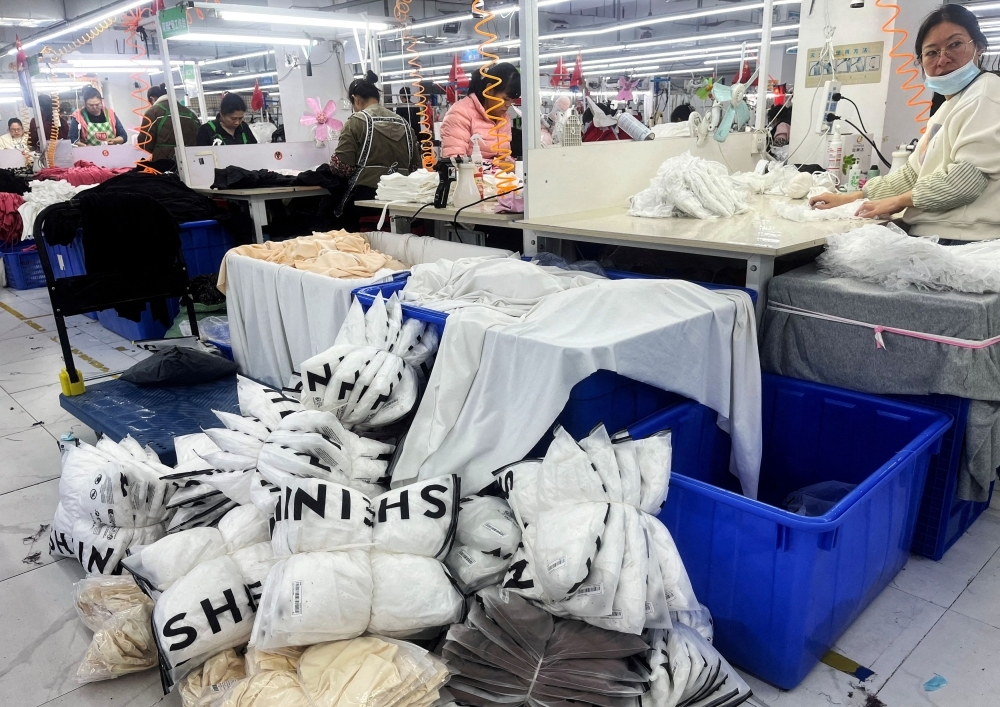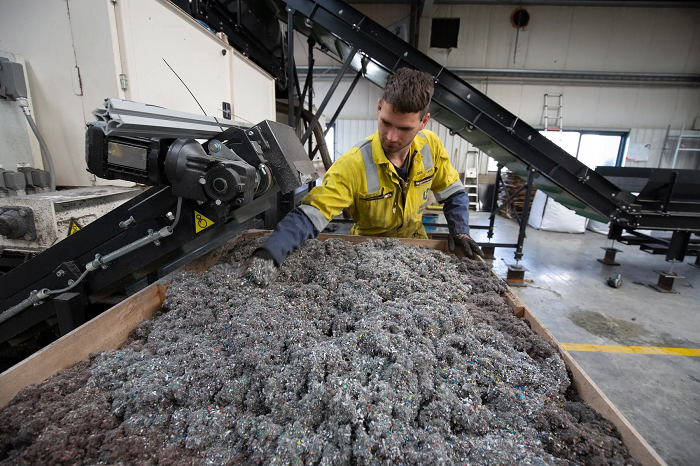FW
The Lenzing Group is introducing the eco-responsible process for the production of LENZINGTM ECOVEROTM branded viscose fibers, which were first launched by Lenzing in autumn 2017 at its Chinese location Lenzing Nanjing Fibers (LNF). As of now, the Lenzing Group produces LENZINGTM ECOVEROTM fibers at its sites in Lenzing (Austria) and China.
LENZING™ ECOVERO™ viscose fibers are derived from sustainable wood and pulp, coming from certified and controlled sources (FSC® or PEFCTM certified) following the stringent guidelines of the Lenzing Wood and Pulp Policy. These fibers have been certified with the EU Ecolabel, a label of environmental excellence and they can be robustly identified in the final product.
Lenzing follows strict environmental standards during viscose production. Both the Lenzing site and the production facility in Nanjing comply with the stringent guidelines of the EU Ecolabel. The label of environmental excellence is only awarded to products and services which have a significantly lower environmental impact throughout their lifecycle: from raw material extraction, to production, distribution and disposal.
Levi’s has collaborated with Karla Welch to create a special collection of new denim classics.
Karla Welch is a celebrity stylist. Her clients include Justin Bieber, Tracee Ellis Ross, and Lorde.
The collection includes two new versions of the 501 jean, an original fit and a wide-leg flare. Levi's x Karla also includes a reversible sherpa jacket, a leather fringe trucker jacket, a boiler suit, and a button-down western shirt with patent leather pocket.
This is Welch's second designer collaboration, having previously worked with Hanes for another affordably priced collection.
Levi's celebrates 501 day on May 20, the day it received its patent on the 501 jean.
Levi Strauss has devised a new operating model that ushers denim finishing into the digital era.
Project FLX (future-led execution) digitizes denim finish design and enables a responsive and sustainable supply chain at an unparalleled scale. By replacing manual techniques and automating the jeans finishing process, Project FLX radically reduces time to market — and eliminates thousands of chemical formulations from jeans finishing.
Using this method Levi Strauss can replace manual techniques and automate the time-consuming, labor-intensive and chemical-reliant process of hand-finishing. By using lasers in new ways, finishing time is cut dramatically – from two to three pairs per hour to 90 seconds per garment, followed by a final wash cycle.
The Cambodian Confederation of Unions (CCU) issued a statement expressing its concern that the upcoming election will impact garment workers, and that if the political climate isn’t improved they could face dire consequences in the form of sanctions or boycotts. According to a World Bank report from 2016, 45 percent of Cambodia’s garment exports end up in the EU, while 25 percent go to the United States.
Earlier this year, representatives from VF – the parent firm of brands such as The North Face, Jansport and Timberland – visited Cambodia and delivered a petition to Prime Minister Hun Sen as well as to the Ministry of Labour, expressing their concern for “recent actions that seem to undermine progress toward improving worker rights”.
VF sources from over 20 factories in Cambodia and spends between $350 and $400 million here every year, according to the Labour Ministry. A report from the Ministry of Industry and Handicrafts showed that factories in the country generated $10.79 billion last year, $7 billion of which came from export-focused garment manufacturers.
Local textile manufacturing companies in Ghana have appealed to the government for tax exemptions on their products as an incentive to help revive the industry. According to them, this will help them compete with the influx of cheap textile products from China and other parts of the world.
According to the textile manufacturing companies, about 70 pe rcent of textiles on the Ghanaian market are cheap imported products mostly from Togo and China. The remaining 30 percent is shared among three local textile companies – Ghana Textile Printing (GTP), Akosombo Textiles Ltd (ATL) and Printex. These three companies currently produce about 30 million yards of fabrics even though it has the capacity to do about 60 million annually. The tax stamp is likely to curtail the situation.
US apparel retailers have been beaten by the low prices found at fast fashion stalwarts like H&M and Forever 21 and at off-price retailers like T.J. Maxx, and that is squeezing margins.
The specialty retailers, in a recent Morgan Stanley's report say they are working to get their merchandise mix right in order to avoid over-stacking sale racks. Much of that involves righting the supply chain, speeding up production and employing analytics to ensure that supply meets demand.
That also means getting the customer experience in stores right, just as in case of Horowitz, which has embarked on a new store concept that is expanding after initial tests.
This year, the retailer will open four new stores using the prototype it runs in select areas and will remodel eight others along those lines.
A meeting of stakeholders on Samarth – Scheme for Capacity Building in Textile Sector under the Skill India Mission was held in New Delhi recently to familiarise the stakeholders about the scheme and its guidelines.
The objective of the new scheme is to train the youth for gainful and sustainable employment in the textile sector covering the entire value chain of textiles, excluding spinning and weaving.
The scheme, approved by the Cabinet Committee on Economic Affairs in December 2017, will provide demand driven, placement oriented National Skills Qualifications Framework (NSQF) compliant skilling programmes to incentivise and supplement the efforts of the industry in creating jobs in the textiles sectors.
The scheme aims to train 1 millionpeople (9 lakh in organised and 1 lakh in traditional sector) over a period of 3 years (2017-20), with an outlay of Rs. 1,300 crore.
Delta Galil, based in Tel Aviv, Israeli, named Tim Baxter as the new chief executive officer of the 7 For All Mankind and Splendid brandsdivision. He will replace Paula Schneider, the former chief executive of American Apparel and president of Warnaco Swimwear Group.
With over 26 years of experience in Macy’s Inc, where he served as the chief merchandising officer, Baxter will work out of New York and Los Angeles and set the direction for 7 For All Mankind and Splendid, two Los Angeles contemporary labels that Delta Galil acquired in 2016 from the VF Corp.
Currently, Baxter is a member of the Jay H. Baker Retailing Center at the Wharton School of the University of Pennsylvaniaadvisory board.
He holds a bachelor’s degree in business psychology from Miami University in Ohio.
Cotton seed companies in Punjab have reported low demand for BT cotton seeds, the variety that accounts for most of the cotton grown in the country.
This is due to the farmers shifting to other crops, especially paddy and maize, which yield higher returns.
Accordingly, cotton acreage in the state this kharif season is expected to drop by 15-20 per cent despite an 8 per cent discount in price of seeds this year. If the sowing doesn’t pick up pace, it is likely to affect the revival of cotton in Punjab, where acreage under the cash crop had jumped by about half in 2017-18.
Cotton, especially BT cotton, was grown over 12.2million hectares in India in 2017-18.
In recent years, pest infestation, high input costs and drop in earnings in cotton have hit farmers hard.
To end poverty wages that haunt workers in Ethiopia’s textile and garment sector, IndustriALL Global Union affiliate the Industrial Federation of Textile, Leather and Garment Workers Trade Unions (IFTLGWU) is leading a campaign for better wages, workers’ rights to organise, and collective bargaining.
The campaign targets the industrial parks set up by the government including Bole Lemi in Addis Ababa where South Korean garment manufacturer, Shints, employs 4,300 workers, of whom 3,800 are union members. Other parks targeted by the campaign includeHawassa and Mekele.
According to these unions, minimum wages are the starting point in reversing low wages and they should be included in the new labour laws under consideration.
Eventually the unions want to shift the campaign to living wages. Unions are campaigning for minimum wages above ETB 3373 (US$121). These wages can be pegged using the official minimum wage, ETB1800 (US$64)), or the consumer price index, ETB2400 (US$86). Current wages average below US$50.
According to the views expressed in a workshop held in Hanoi in May 9, 2018, the Comprehensive and Progressive Agreement for Trans-Pacific Partnership (CPTPP) agreement will to boost Vietnam’s textiles and garment exports to Australia to double-digits.
The workshop, jointlyheld by the Vietnam Textile and Apparel Association (VITAS) and the IEC Group of Australia, focused on measures to help Vietnamese textiles and garment enterprises increase exports to Australia.
The total textiles and garment import turnover of the CPTPP member countries, according to reports, exceeded 53 billion USD in 2017, of which Australia was the third biggest import market with total turnover reaching over 6.2 billion USD, accounting for 11.67 percent.
Vietnam earned over 4.8 billion USD from exporting textiles and garments to the other CPTPP member nations in 2017, making up 9.07 percent of the market share.












